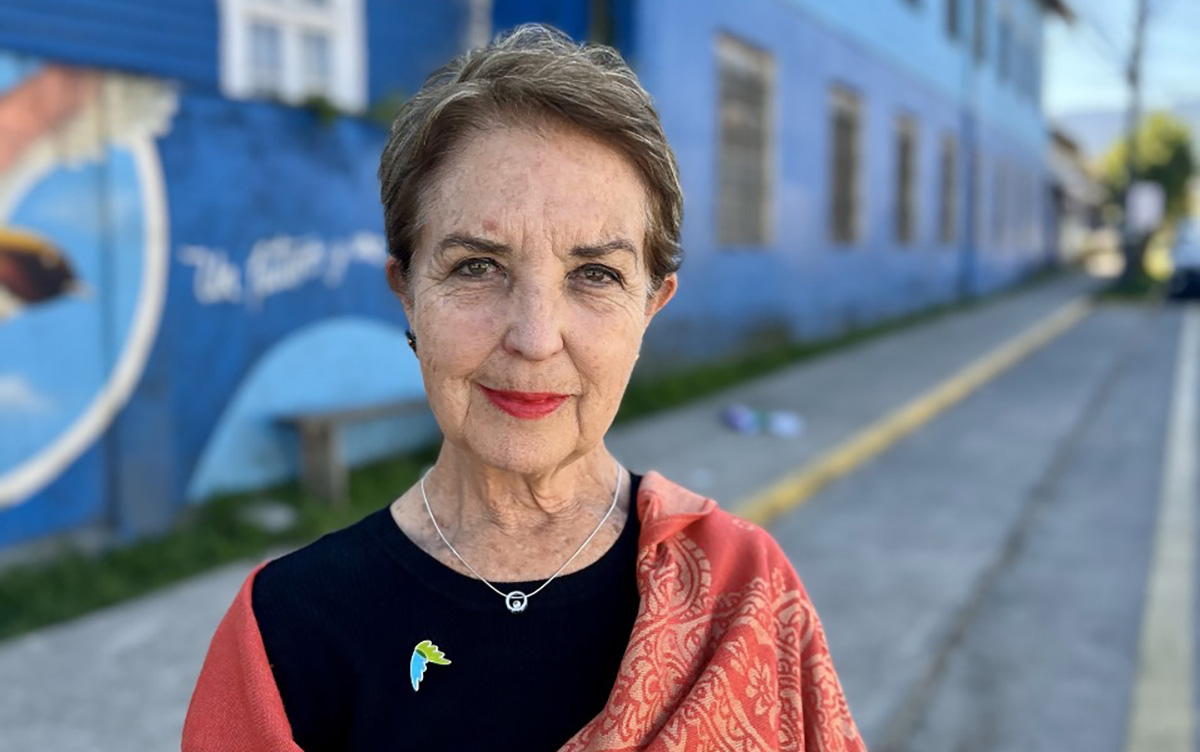Chile
Transgender woman sues Chilean national police
Isabella Panes alleges she suffered harassment, exclusion after becoming ‘carabinera’

Isabella Panes in 2022 was celebrated as a symbol of inclusion.
Wearing an olive green uniform and a shy smile, she appeared in the media and on social media as Chile’s first trans female “carabinera” or national police officer. The Carabineros promoted Panes as a sign of openness, but that story has become a dramatic case of institutional discrimination.
Panes today faces the Carabineros in court.
She has denounced a series of systematic acts of exclusion, harassment at work, and violation of fundamental rights that she and her defense team maintains pushed her into a mental health crisis that almost cost her her life.
“My hope is that tomorrow we will be able to live in a world of equality for all. Just that we understand that we are human beings and we have to make life a lot easier for each other,” Panes told the Washington Blade during an exclusive interview.
Panes, 29, grew up in Laja in the Biobío region.
She dreamed of becoming a “carabinera” since she was a child, despite the fact that she faced discrimination because of her gender identity. After years of effort, surgeries and a difficult transition, Panes enrolled in the Carabineros Academy in 2021.
Panes faced the challenge of making her medical processes compatible with the physical demands of training. Even so, she graduated with good marks, and was recognized as part of the new institutional image the Carabineros wanted to project after the 2021 social unrest tarnished their image.
This institutional support disappeared after the media campaign.
Panes alleges she was marginalized from operational duties and relegated to administrative tasks, despite her interest in and training to patrol the streets like any other officers.
“I joined the Carabineros to serve, not to be a marketing decoration,” she said. “I was offered to be part of the change, but only if I kept quiet and accepted the mistreatment.”
The accusations against the Carabineros are serious: Constant mockery by colleagues, dissemination of private information about her personal life, invasive questions about her body and sexual orientation. Panes’s legal representatives said this abuse took place within a context where the institution did not take effective measures to protect their client.
The Carabineros Social Security Administration, known by the Spanish acronym Dipreca, also refused to cover her transition-related medical procedures, arguing they were “aesthetic,” despite medical reports that indicated their importance for Panes’s mental health and well-being.
Panes in January attempted to kill herself by suicide. She managed to survive after calling Chile’s 4141 mental health care number for help.
“They were killing me slowly, from the inside,” said Panes.
Panes has brought her case to the Supreme Court after a lower court ruled in favor of Dipreca’s decision to not cover her medical treatments.
Her legal team in a lawsuit has also accused the Carabineros of employment and systematic discrimination. Panes is seeking damages and institutional reforms.
“The Carabineros used Isabella to clean up its public image, but when it came to guaranteeing real rights, they abandoned her,” said Javiera Zúñiga, spokesperson for the Movement for Homosexual Integration and Liberation, a Chilean advocacy group.
“It is not enough to show up at the Pride march,” she added. “True inclusion is demonstrated in deeds, in daily dealings, in respect for the dignity of all people.”
Panes’s case starkly exposes the limits of diversity policies when there is no deep institutional commitment to implement them.
“I am no longer afraid,” said Panes, ”What happened to me cannot happen again. Not for me, but for all those who come after me.”
Chile
2024 was ‘year of regression’ for LGBTQ rights in Chile
Advocacy group blamed rise in ultra-right, government inaction

A report that a Chilean advocacy group released on Tuesday says 2024 was a “year of regression” for LGBTQ rights.
The Movement for Homosexual Integration and Liberation (Movilh)’s 23rd Sexual and Gender Diversity Human Rights report notes LGBTQ rights for the first time since democracy returned to Chile in 1990 not only stopped advancing, but saw significant rollbacks in the three branches of government.
The Movilh report describes 2024 as “the year of regression,” noting 23.5 percent of human rights violations against LGBTQ people over the last two decades occurred last year. A total of 2,847 discrimination complaints were reported in 2024, representing a 78.7 percent increase over the previous year.
The report documents two murders, 44 physical or verbal assaults, two incidents of violence in police stations, 89 reports of abuse in the workplace, and 65 incidents in educational institutions in 2024. The transgender community was particularly affected, with a 462.6 percent increase in discrimination cases compared to 2023.
The Movilh report notes the growing influence of the ultra-right, whose narratives have fostered hate speech, is one of the main factors behind the deterioration of LGBTQ rights in Chile. The advocacy group also criticizes authorities who have remained silent in the face of these attacks, even though they say they support the LGBTQ community.
The report specifically singles out the Executive Branch.
Movilh specifically highlights the prohibition of public funds for hormone treatments for trans minors and the postponement of these procedures in public hospitals. The government reversed course after intense pressure and judicial appeals.
The report also criticizes the judiciary.
The Oral Criminal Trial Court of San Antonio refused to classify the murder of a trans woman as a femicide, arguing her identity card still reflected the gender assigned to her at birth. The Court of Appeals of Santiago also ordered the removal of a homophobia complaint on social media, setting what NGOs have described as a dangerous freedom of speech precedent.

annual Pride parade on June 29, 2024. (Photo courtesy of the Movement for Homosexual Integration and Liberation)
The report notes Valparaíso, Metropolitana, and Biobío are the three regions with the highest number of discrimination complaints, with 51.3 percent, 25.1 percent, and 5.8 percent respectively. Reported cases increased in 11 of Chile’s 16 regions, with Ñuble leading the way with a 300 percent increase.
Faced with this bleak panorama, advocacy groups have intensified their efforts to denounce the violence and demand LGBTQ rights are once again guaranteed. Movilh, along with other organizations, have approached the Inter-American Commission on Human Rights and the U.N. about the situation in Chile.
“We are seeing a reversal of rights that cost decades of struggle,” warns the report. “If the State does not act urgently, we run the risk of discrimination and violence becoming institutionalized.”
Chile
New face of Chilean politics includes LGBTQ rights agenda
Municipal and regional elections took place on Oct. 27

Chile’s municipal and regional elections that took place on Oct. 27 have brought with them a renewed focus on LGBTQ rights and diversity.
In a context where the center right has managed to stand out against the Republicans, political parties have incorporated into their platforms a commitment towards the inclusion of queer people. Some Chilean political scientists say the elections have shown a country inclined to vote for the opposition Chile Vamos coalition, even though the left governs Chile.
The ruling party, grouped in Contigo Chile Mejor, had a setback similar to what happened in the 2021 municipal and regional elections — it lost 39 communes that include Santiago, San Miguel, Ñuñoa, and Independencia.
Voters in Maipú, the country’s second most populous commune, re-elected Tomás Vodanovic from President Gabriel Boric’s Frente Amplio.
Frente Amplio also won in Viña del Mar, and other communes, and saw victory in others that include Valparaíso, where the Chilean Congress is located.
Openly LGBTQ candidates have emerged since 2012, and some of them have made history. These include Congresswoman Emilia Schneider, a Frente Amplio member who is transgender.
Several LGBTQ candidates have resonated with voters within the framework of these elections; not only highlighting their identity, but their commitment to the struggle for equal social rights.
Gloria Hutt, president of Evolución Política (Evópoli), a party that is part of the Chile Vamos coalition, stressed the importance of diversity in its agenda.
“Part of Evópoli’s agenda is inclusion and diversity, including the diversity of communities of different sexual identities. And in this election we had a dozen candidates who belong to sexual diversities, some of them won, others did not, but it is part of the agenda with which we are permanently working,” Hutt told the Washington Blade.
“We believe that it is also part of the freedom of people to deploy their life project without anything else interfering but their own identity and without prejudice preventing them from deploying that identity,” she added.

The reelection of figures, such as Viña del Mar Mayor Macarena Ripamonti, and Vodanovic’s success in Maipú reflect significant support for the progressive agenda.
“First of all I would like to emphasize that we saw an impeccable process where citizens were able to express their preferences,” Frente Amplio Secretary-General Andrés Couble told the Blade. “We believe that the results allow us to look to the future with optimism.”

Couble highlighted the importance of LGBTQ candidacies in decision-making spaces.
“We think it is important to promote them and that they reach elected positions, because they allow us to bring the struggles for equal rights and respect and promotion of diversity to institutional spaces,” he said.
Couble at the same time highlighted the victory of Bladymir Muñoz, the Chilean councilman who received the most votes, as an example of the advance towards a more inclusive representation.
Muñoz is a Frente Amplio member. He received 41,669 votes in Maipú.
-

 District of Columbia5 days ago
District of Columbia5 days agoFinal push to raise funds, fill D.C. hotels as WorldPride nears
-

 El Salvador3 days ago
El Salvador3 days agoGay Venezuelan makeup artist remains in El Salvador mega prison
-

 District of Columbia4 days ago
District of Columbia4 days agoReenactment of 1965 gay rights protest at White House set for April 17
-

 Maryland5 days ago
Maryland5 days agoFreeState Justice: Transgender activist ‘hijacked’ Moore’s Transgender Day of Visibility event











